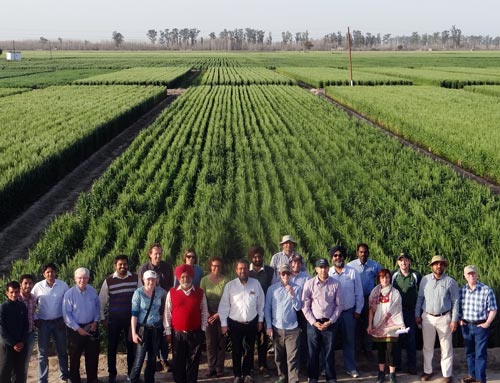By Pankaj Singh, Parvinder Singh, H.S. Sidhu and M.L. Jat/CIMMYT
A delegation from Colorado State University, United States, and the University of Adelaide, Australia, visited the Borlaug Institute for South Asia (BISA) in Ludhiana, Punjab, on 10 March. The visit focused on advances in precision agriculture as well as conservation agriculture (CA) and climate change. Etienne Duveiller, BISA director of research, gave an overview of the institute as well as its research and development activities.
BISA research focuses on wheat and maize germplasm and precision and conservation agriculture to address degradation of land and water resources, high labor costs, low labor availability, increasing input costs and climate variability. He emphasized that BISA works closely with the regional public and private sectors. H.S. Sidhu, senior research engineer at BISA, explained that most BISA land is farmed using CA practices and is successfully producing maize, wheat, soybeans, mustard, pigeon peas, cotton and rice under zero tillage and without burning residue, using second generation machines. This showcases the uses of CA for different cropping systems and its benefits to the farming and scientific community. Uttam Kumar and Ravi Valluru explained the development of high-yielding varieties of wheat for South Asia using a genomic selection approach for tolerance to heat stress and drought. They also showed advanced international breeding lines and hybrid wheat screening.

M.L. Jat, senior cropping systems agronomist and South Asia leader for CIMMYT and the CGIAR Research Program on Climate Change, Agriculture and Food Security (CCAFS), explained that CA-based crop management technologies have been developed and deployed in several production systems and ecologies. With the recent focus on the importance of CA, more strategic research on precision agriculture such as nutrient placement, water usage, cultivars and weed management has been initiated. Jat also explained how climate change and water scarcity are causing adverse impacts on productivity, mainly due to terminal heat stress.
A field trial on wheat genotype and management interactions to adapt cultivars to contrasting management systems and planting time was also discussed to enhance crop and water productivity. Sidhu, Jat and the CIMMYT-BISA team working on the farm coordinated visits to various research trials and demonstrations of the latest CA machinery while Parvinder Singh and Pankaj Singh also shared their experiences.
To demonstrate small-scale CA mechanization, the two-wheel tractor-operated turbo “happy seeder” and laser leveller were also displayed. The visitors were impressed with the ability of the high clearance seeder and tractor to seed relay wheat into standing cotton.
 Climate adaptation and mitigation
Climate adaptation and mitigation